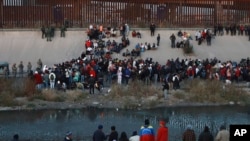The U.S. Supreme Court is expected to hear a case Monday that some First Amendment experts warn could affect how journalists cover immigration.
The case, United States v. Hansen, stems from the 2017 prosecution of Helaman Hansen, who was convicted in connection with a fraudulent adoption agency that he ran.
Hansen is attempting to have parts of his conviction overturned, saying parts of a federal law against encouraging or inducing unlawful immigration to the U.S. violate First Amendment rights.
The government asked the Supreme Court to hear the case after a lower court ruled that the law was “overbroad and unconstitutional,” according to the Reporters Committee for Freedom of the Press.
Media experts agree, saying such broad provisions could leave journalists vulnerable to prosecution if they cover a range of issues, from poor security at the border to commentary on relaxing immigration policy.
In the case of Hansen, “what he had done was run a fraudulent adult adoption agency that falsely promised people a path to [U.S.] citizenship,” Grayson Clary, attorney at the Reporters Committee for Freedom of the Press, told VOA.
In a news briefing, attorneys for the American Civil Liberties Union said that under the so-called encouragement provision of the federal law, it is a felony to “encourage or induce” an individual to “come to, enter or reside in the United States” in the knowledge the person would be in violation of the law.
But that provision is too broad, according to immigration lawyers and journalists, and it could open space for prosecutions of journalists publishing newsworthy and factual content even outside the immigration context.
“If a news report can be deemed illegal for giving migrants ideas on how to cross the border, why can’t the same reasoning apply to, say, criticism of police departments that exposes incompetences that criminals might exploit? What about reporting of abuses that might lead protesters to trespass on government property, or stay out past curfews?” Seth Stern, director of advocacy at the Freedom of the Press Foundation, wrote on March 15.
Stern wrote that justices have repeatedly held that action to punish the publication of information rarely “satisf[ies] constitutional standards,” but the court has yet to say accurate and truthful reporting “can never be punished.”
Still, he wrote, “that doesn’t mean prosecutors won’t try. The mere prospect of arrest would surely encourage self-censorship.”
Violating such provisions carries a maximum penalty of five years in prison. But if the violation is committed “for the purpose of commercial advantage or private financial gain,” a separate penalty can increase imprisonment to up to 10 years.
“No one is especially keen on defending what [Hansen] did,” Clary said. “But in the First Amendment's context, there is this doctrine called overbreadth.”
“[That] means that even if you have been prosecuted for something that it's constitutional for the government to prohibit, you can still argue that the law you're prosecuted under violates the First Amendment.”
In February, the Freedom of the Press Foundation, the National Association of Hispanic Journalists, the National Press Photographers Association and the News Leaders Association filed a joint brief with the Supreme Court. In it, they urged the court to rule that the federal law making it a felony to encourage noncitizens to reside in the U.S. unlawfully violates the First Amendment.
The Department of Justice referred VOA to its filings on the case and said it could not comment about ongoing litigation.
Elizabeth Barchas Prelogar, the solicitor general of the United States, filed a brief in which she wrote that "if a defendant assists in the commission of a criminal violation of the immigration laws, the defendant may be prosecuted under the general federal prohibition on aiding and abetting."
She added that Hansen does not have a valid claim of protection under the First Amendment.
"Historically, the statute has been an important tool for prosecuting numerous smuggling activities that facilitate unlawful immigration — conduct that, like respondent’s own sham adoption scheme, has no claim to protection under the First Amendment," she wrote.
Clary told VOA that rights advocates see the case as important “because the government has not always approached the statute as if it was as narrow as it now claims it is.”
“In particular, the government relied on this provision of the law to justify maintaining a watch list of reporters and others who were documenting migrant crossings at the border,” Clary said.
In 2019, NPR and The Intercept published reports that detailed the harassment that journalists, immigration activists and attorneys say they experienced from border officers at the U.S.-Mexico border.
The story was first reported on by the San Diego TV station KNSD.
According to leaked documents, the U.S. and Mexican governments were keeping a database of those who interacted with migrants or had offered assistance. That resulted in journalists and immigration lawyers being the target of inspections from border officials on both sides.
At the time, publications sent questions to U.S. Customs and Border Protection, the agency responsible for U.S. ports of entry, and to Mexican authorities, but officials did not comment.
Andrew Meehan, CBP’s assistant commissioner for public affairs, told The Associated Press the agency “has policies in place that prohibit discrimination against arriving travelers and has specific provisions regarding encounters with journalists,” and that “CBP will continue to maintain a high standard of accountability and transparency with the media and public.”
Clary told VOA that "we think there's been overreach in the past, which highlights why the sort of text of the statute is so startlingly broad, and we hope one way or the other the Supreme Court's decision is going to make clear that that kind of abuse can't be repeated in the future.”
For Monday’s hearing, Clary noted that Hansen was convicted of violating the statute against encouraging or inducing unlawful immigration to the U.S. as well as violating a number of other statutes.
"He's essentially hoping that by getting this part of his conviction thrown out, his prison sentence will be reduced,” Clary said.







